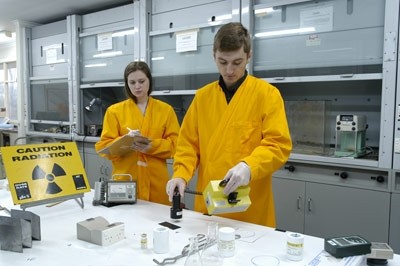How To Become A Radiation Safety Officer

There are an enormous range of duties and career opportunities in the field of radiation control. Depending on the type of license granted and the state in which he or she works, responsibilities for the radiation safety officer (RSO) can vary from small business requests to hospital and governmental agency applications. Protecting the health of employees that work near radioactive materials, as well as the community at large, is the RSO's key responsibility. Training and experience are essential to higher paying jobs.
Instructions
1.To embark on this career, you need a predisposition for mathematics and science, and attendance at an accredited technical college or university. Take a minimum of 20 hours in the physical or biological sciences or in engineering, depending on your field of interest.
2.Determine the kind of RSO career you wish to pursue. Some only require a bachelor's degree (or equivalent training), while others require a Master's or doctorate degree in the biological sciences, physics, medical physics or applied mathematics.
3.You will need anywhere from 40 to 200 hours of classroom and laboratory training in specialized areas such as radiation physics and instrumentation, radiation safety, mathematics as it applies to the use and measurement of radioactivity and possibly radiation biology and dosimetry (the manner of measuring the quantity of ionizing radiation). The types of coursework and hours needed are determined by the RSO program you pursue.
4.After graduation you will need a number of years (generally from two to five, but possibly more) of full-time professional experience, some of which may come from graduate work, under the supervision of a qualified adviser who is certified and recognized as a radiation safety officer specialist by the United States Nuclear Regulatory Commission or an agreement state (states that have the right to write their own regulations).
5.After completing this first period of supervised professional training, you must then complete and pass an extensive exam administered by a board of certified specialists that evaluate your radiation knowledge and competency before you are allowed to work alone. Once you are fully certified, you will have the ability to shut down a potential hazard by your own authority.
6.Finally, find employment through governmental agencies such as the United States Nuclear Regulatory Commission, which hires RSOs at entry and mid-level career positions. Or go to websites like Monster.com to find job opportunities in the private sector.
Instructions
1.To embark on this career, you need a predisposition for mathematics and science, and attendance at an accredited technical college or university. Take a minimum of 20 hours in the physical or biological sciences or in engineering, depending on your field of interest.
2.Determine the kind of RSO career you wish to pursue. Some only require a bachelor's degree (or equivalent training), while others require a Master's or doctorate degree in the biological sciences, physics, medical physics or applied mathematics.
3.You will need anywhere from 40 to 200 hours of classroom and laboratory training in specialized areas such as radiation physics and instrumentation, radiation safety, mathematics as it applies to the use and measurement of radioactivity and possibly radiation biology and dosimetry (the manner of measuring the quantity of ionizing radiation). The types of coursework and hours needed are determined by the RSO program you pursue.
4.After graduation you will need a number of years (generally from two to five, but possibly more) of full-time professional experience, some of which may come from graduate work, under the supervision of a qualified adviser who is certified and recognized as a radiation safety officer specialist by the United States Nuclear Regulatory Commission or an agreement state (states that have the right to write their own regulations).
5.After completing this first period of supervised professional training, you must then complete and pass an extensive exam administered by a board of certified specialists that evaluate your radiation knowledge and competency before you are allowed to work alone. Once you are fully certified, you will have the ability to shut down a potential hazard by your own authority.
6.Finally, find employment through governmental agencies such as the United States Nuclear Regulatory Commission, which hires RSOs at entry and mid-level career positions. Or go to websites like Monster.com to find job opportunities in the private sector.
- 31b0e112708f4530fb196d61004d2fa059.jpg